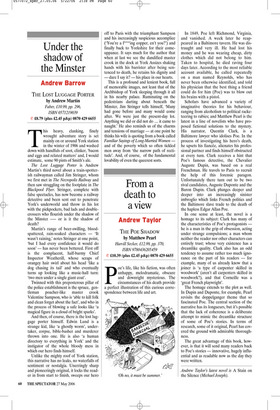Under the shadow of the Minster
Andrew Barrow
THE LOST LUGGAGE PORTER by Andrew Martin Faber, £10.99, pp. 296, ISBN 0571219039 ✆ £8.79 (plus £2.45 p&p) 0870 429 6655 This heavy, clanking, finely wrought adventure story is set mainly on or around York station in the winter of 1906 and washed down with handfuls of soot, clinker, ‘bacon and eggs and related matters’ and, I would estimate, some 90 pints of Smith’s ale.
The Lost Luggage Porter is Andrew Martin’s third novel about a train-spotterish railwayman called Jim Stringer, whom we first met in The Necropolis Railway and then saw struggling on the footplate in The Blackpool Flyer. Stringer, complete with false spectacles, has now become a railway detective and been sent out to penetrate York’s underworld and throw in his lot with the pickpockets, bad lads and doublecrossers who flourish under the shadow of the Minster —– or is it the shadow of death?
Martin’s range of beer-swilling, bloodspattered, rain-soaked characters — ‘It wasn’t raining,’ notes Stringer at one point, ‘but I had every confidence it would do soon’ — has never been bettered. First off is the complacent, half-barmy Chief Inspector Weatherill, whose scraps of orangey hair swirl about his head ‘like a dog chasing its tail’ and who eventually turns up looking like a music-hall turn: ‘two men under a single giant coat’.
Twinned with this preposterous pillar of the police establishment is the spruce, gentleman poacher-like master crook Valentine Sampson, who is ‘able to kill folk and clean forget about the fact’, and who in the process of blowing a safe looks like ‘a magical figure in a cloud of bright sparks’.
And then, of course, there is the lost luggage porter himself. Edwin Lund is a strange kid, like ‘a ghostly worm’, undertaker, corpse, bible-basher and murderer thrown into one. He is also ‘a human directory to everything in York’ and the instigator of the whole bloody mess in which our hero finds himself.
Unlike the mighty roof of York station, this narrative has no leaks, no waterfalls of sentiment or nostalgia. Unerringly sharp and pioneeringly original, it locks the reader in from start to finish, sweeps our hero off to Paris with the triumphant Sampson and his increasingly suspicious accomplice (‘You’re a f***ing copper, en’t you?’) and finally back to Yorkshire for their comeuppance. It says much for the author that when at last we see the dandified master crook in the dock at York Assizes shaking hands with his barrister after being sentenced to death, he retains his dignity and — dare I say it? — his place in our hearts.
This is a profound and lenient book, full of memorable images, not least that of the Archbishop of York sleeping through it all in his nearby palace. Ruminating on the pedestrians darting about beneath the Minster, Jim Stringer tells himself, ‘Many had gone before and many would come after. We were just the present-day lot. Anything we did or did not do ... it came to naught.’ He also reminds us of the charms and tensions of marriage — at one point he thinks his wife is quoting from a book called Familiar Sayings of Long-Married Women and of the poverty which so often tickled men away from ‘the narrow path of rectitude’. And, of course, of the fundamental lovability of even the queerest sorts.










































































































 Previous page
Previous page